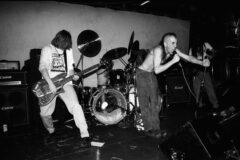This story was originally published in the February 1999 issue of Spin. On the occasion of our list of best alt-rock songs of 1998, we’re republishing it here.
Holding court in his darkened rehearsal lair in Los Angeles, New Radicals brain trust Gregg Alexander cuts an imposing figure. His 6’5″ frame topped by a dome that has been shaved inmate-bald, the 28-year-old is given to wild gesticulations and table-pounding when he’s making a particularly salient point. At these moments, he resembles a cracked general plotting a quixotic revolution.
And, in a sense, he is. Maybe You’ve Been Brainwashed Too, New Radicals’ debut disc, is a Trojan horse left on the doorstep of a world gone ill. “If people don’t start using word-of-mouth to talk about real problems, society is in deep shit,” he says solemnly. “A voice on the radio isn’t gonna mean anything if a country is bombing the shit out of every place.”
Such proselytizing is common on Brainwashed, a melodic, if not contradictory, collection of rants against consumer society, celebrity culture, and institutionalized apathy, set against a backdrop of innocuous-sounding blue-eyed soul-pop. The album’s hit single “You Get What You Give” is orchestrated Up With People pop notable for a dis of Beck, Courtney Love, and Marilyn Manson, which ends, “Come around, we’ll kick your ass in.” The video recasts “Smells Like Teen Spirit” in a New York shopping mall, and throws in some Planet of the Apes-style class warfare for good measure.

Also Read
30 Overlooked 1992 Albums Turning 30
Alexander insists that calling out La Love, et al., in the single’s caustic coda wasn’t his intention. Rather, he wanted to see if the media would focus on the preceding lines (which broach more “human existence-altering” topics) or the celeb-centric bluster that follows. He says his experiment produced a “real revelation”: Everyone’s obsessing over the name-calling.
Alexander’s dance-friendly diatribes raise the question: incredibly cynical exercise in prepackaged pseudo-rebellion, or a gutsy (if naive) attempt to manipulate the beast from within? Alexander acknowledges the inherent irony, but notes that fame is the tallest soapbox going for an earnest young man with a wake-up call to deliver. “Rock stars, film stars, and sports stars are the last renegades of society,” he says. “The problem is, nobody’s using it for anything but their own selfish benefit.”
Alexander’s theories on the proper applications of celebrity are, perhaps, tempered by his own protracted tango with fame. Raised in Grosse Pointe, Michigan, by a “low-grade dysfunctional” family whose matriarch switched religions on a monthly basis, Alexander split at 16 and scored his first record deal at 17. He released two much-ignored major-label albums under his own name in 1989 and 1992, then signed with MCA in late 1997. “It’s his time now, it wasn’t back then,” says Michael Rosenblatt, the MCA A&R guy who afforded Alexander his third shot. “He’s got something to say. Hopefully, people will listen.” Even if he’s saying it from a glass house? “The Sex Pistols did that very well, too.”
And Alexander’s savvy spinmeistering would make Malcolm McLaren proud. “Now, I have more of a sense of how to make the band more relevant to the big picture, the world at large—” Alexander suddenly cuts himself short, and unleashes a self-conscious cackle. “How’s that for arrogant?”




